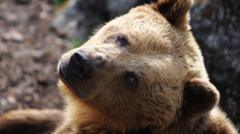In a recent controversial decision, Slovakia's government has moved to sell the meat of brown bears, a species under protection by EU law, following approval for a substantial cull. The cabinet's plan to cull up to 350 of the country's estimated 1,300 brown bears comes in response to a surge in dangerous human-bear encounters, including several fatal incidents that have raised public safety concerns.
Supporters of the culling argue that overpopulation has led to more frequent bear attacks, with Slovakia recording 54 bear attacks from 2000-2020 and an average of 10 attacks annually in recent years. Following a tragic incident where a man was killed by a bear in Central Slovakia, Prime Minister Robert Fico underscored the government's stance, insisting that citizens should not live in fear of wildlife while enjoying their forests.
Minister of State Filip Kuffa stated that selling bear meat is a viable solution to prevent waste from culled bears, emphasizing that consumable animals should not go to waste. From next week, approved organizations will be allowed to sell bear meat, provided they meet specific legal and hygiene standards. Critics, however, express deep concern regarding the government's approach to wildlife management. Environmental advocates, including opposition politician Michal Wiezik, label the plan as "absurd," contending that previous culling efforts have not successfully reduced the number of bear encounters.
Greenpeace Slovakia's Miroslava Abelova criticized the culling plan as "reckless," urging the government to heed conservation directives instead. The EU mandates strict protections for the brown bear species, allowing lethal measures only in cases of imminent public danger and barring general culling practices.
Bear meat consumption remains a rarity across Europe and is considered a delicacy in specific regions, with sales highly regulated. Concerns over health risks, such as the parasites found in bear meat, necessitate careful safety measures, including rigorous testing for Trichinella before the meat can be sold. Meanwhile, the broader debate on wildlife management and human safety in Slovakia continues as opinions remain divided on the solution to the rising bear population and the associated risks.


















